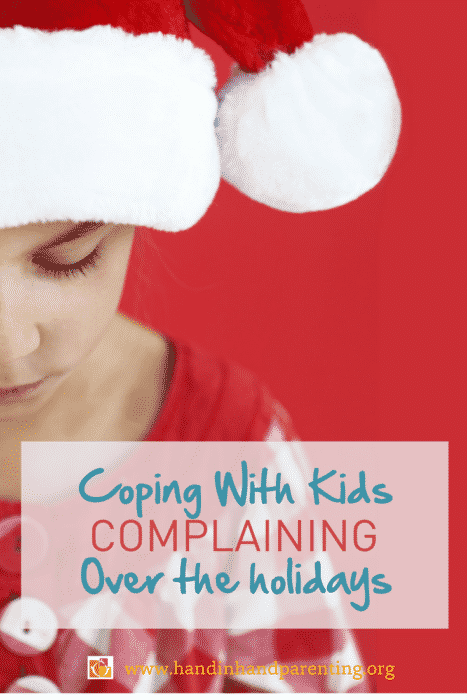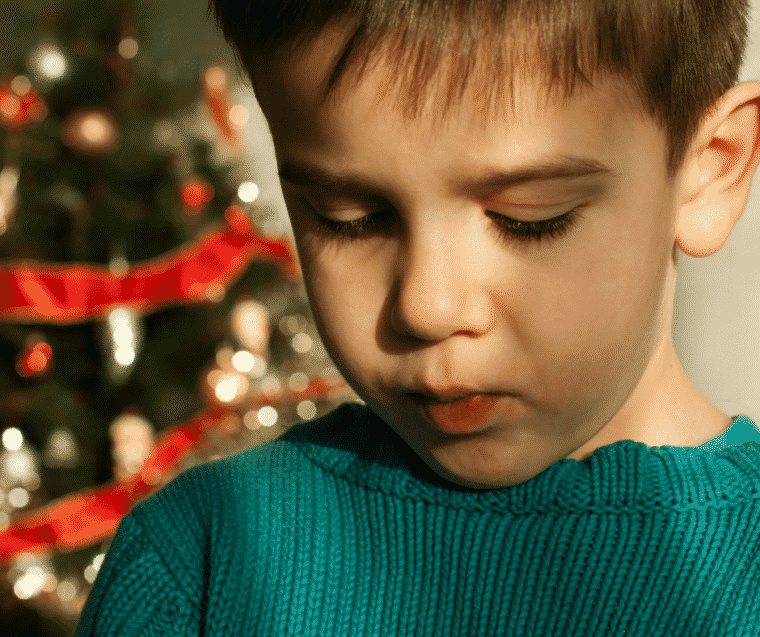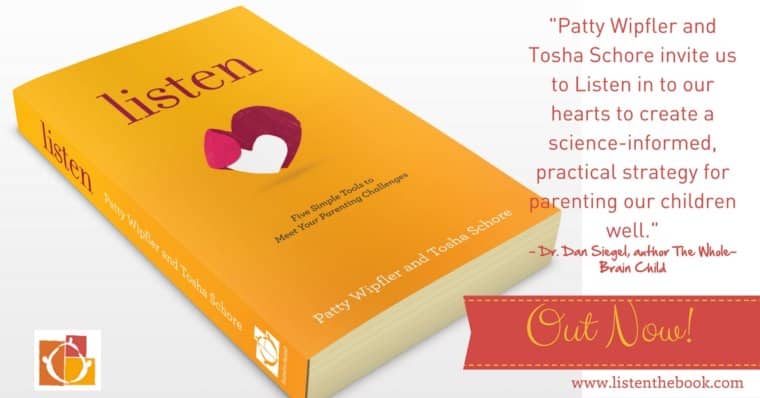 “Somehow my older child didn’t think Santa was fair this year. She felt her sister’s presents were bigger and better, and hers were smaller and worse.
“Somehow my older child didn’t think Santa was fair this year. She felt her sister’s presents were bigger and better, and hers were smaller and worse.
Although I felt badly for her because she truly felt wronged, I wanted to point out why hers were just as good and in some cases better.
And I also had the urge to make her “shut up” and stop complaining about her presents!
I didn’t.
I listened to her while she complained and whined and explained to me how she didn’t like Santa anymore and how Santa was a bad guy.
I tried to tell her Santa and I both loved her.
I didn’t take this personally, which I would have done in years past. Instead, I empathized and listened intently.
She was sad for a while, but once I let her offload the hurt and gave her a chance to be heard, she started to let it go. She actually loved her gifts, and said so at the end of her upset. It was nice to see her come all the way through.
How to Work with “It's Not Fair!”
How many hours do we parents spend trying to make sure everything is fair? We measure ice cream scoops so they’re the exact same size. We count shirts and pants to ensure that everyone gets an equal share of back-to-school clothes. We time our children’s electronics usage so that one doesn’t get a minute more than another. And if one child gets invited to a movie with a friend, we quickly think up a treat to offer the others, so they won’t feel badly.
But, as my kids will tell you, “Life’s not fair!”
If one child has holes in his shoes and another’s shoes are in good shape, only one child is in need of a new pair. If a ten-year-old functions well on ten hours sleep, but her younger brother needs twelve to make it through the day, it makes sense for her to have a later bedtime.
In fact, trying to make life fair for our children works against them. We’re essentially denying them the opportunity to learn to overcome upset.
Instead, let’s gift our children the attention they need to overcome disappointments and feelings of being slighted.
This mother didn’t run out to buy bigger and better Christmas presents. Instead, she Staylistened to her daughter. And by offering her love and connection to heal from hurt, this mother gave her daughter the best gift there is—the ability to acknowledge her upset, feel her way through it, heal, and get back to enjoying life.
What is Staylistening, and Why Do Tears Heal Hurts and Upsets?
 Have you ever felt that your child's reaction is huge compared to whatever minor event set her off crying? Sometimes a child will collect feelings of anxiousness and fears, from little slights to major disappointments seemingly without stress. Ava will carry on painting long after her brother swiped the blue and kept it for himself. Joey will look sad at the Christmas party as the last gingerbread disappears before he helps himself, but will then happily tuck into some popcorn instead.
Have you ever felt that your child's reaction is huge compared to whatever minor event set her off crying? Sometimes a child will collect feelings of anxiousness and fears, from little slights to major disappointments seemingly without stress. Ava will carry on painting long after her brother swiped the blue and kept it for himself. Joey will look sad at the Christmas party as the last gingerbread disappears before he helps himself, but will then happily tuck into some popcorn instead.
No worries.
But slowly, these feelings build up and become harder to contain. As dad chats heartily with his brother and doesn't see his son stand longingly wanting to play ball. When a child's friend at school gets invited to another friend's house for a party and he doesn't. When he wants to show grandma a cool new game, but she's busy frosting cupcakes. Little things individually, each one filling what we call his “emotional backpack.”
Why A Child's Whining Shows A Storm is Coming
Soon, the upsets cannot be disguised. Signs of his discomfort begin to surface:
- He asks and asks and asks for you to “just come see,” or “when can we play?”
- He ignores requests to do things that usually wouldn't cause a fuss.
- He tips over a water glass on the table, accidentally on purpose.
- He takes a cookie you told him were to be saved for the guests visiting later.
Behaviors are a Signal About Emotional Well-being
All of these behaviors are signs that disconnection is present. In this season, so often called silly season, where parents and caregivers are busier than ever, it can be hard finding moments to pay close attention, to take a minute to laugh and to play. That's not anyone's fault, but as disconnection grows, a child will soon demand the attention he needs to feel better. Through tears. Big and loud. Through angry upsets. Seemingly over small things.
Like when Santa deals out what is deemed a less than pleasing present.
Then the tears come. All the feelings squashed until now erupt in a torrent of angry words, fight reflexes, and just, well, “Urggghhhh”!
And when they are listened to, they pass.
A child returns to being sweet, playful and even appreciative.
I Get It, but I Still Lose it When My Kids Complain at Christmas
When a child says his sister's present is better, or he hates the gift he received, it can stir up many deep feelings for us in return. We might feel a child
- Is ungrateful
- Is entitled or spoilt
- Should be thankful
- Is not kind or polite
If he acts this way in front of others, you may also feel embarrassed and judged. You find yourself tight and unable to respond lightly or playfully.
A lot of these feelings begin with how we were raised and the messages we received as children.
How were you listened to if you complained as a child? How do you remember the holidays at your house? How many times did you receive a gift you didn't like but had to smile and say thank you politely?
These factors play a huge role in how difficult or easy you find it to listen to a child complaining about gifts or fairness. If you were not allowed to complain, it takes a lot to listen to your own child, even when you understand the reason why.
It takes practice, for sure, and it also takes preparation.
Three Ways To Get Prepped for “It's Not Fair!”
Taking those feelings you have locked away and sharing them with a Listening Partner is one way to free up space so that you can respond in kind if your child has upsets over gifts and what is and isn't fair over the holidays. You might revisit the times you were chastised or were expected to be compliant or polite through your own disappointments, you might dwell on the feelings that you have around ungratefulness or entitlement.
Go Back in Time
Say the words you wanted to say as a child but could not:
- But those socks are UGLY
- Why does Jane always get better stuff than me?
- I wanted a real dog, not a toy hamster
Let the Anger Loose
Try saying, out loud the harsh, angry things you really want to say to your child. Get them out of your head and out of the way. Be loud, be wild, be sarcastic. If the anger moves to laughter, go there too.
Test Your Responses
Test out a few responses that you could use with your child. Try an angry tone against a neutral tone or even dramatic a playful tone. Some phrases you might want to try are:
- “It's not exactly what you wanted? That's hard”
- “I know sweetie, this is different.”
- “Your sister got the gift you wanted. I see.”
When you have planned for complaining and can interpret your child's behaviors as being less about being spoiled, entitled or wanting and more about connection, you'll find it easier to respond.
But What About The Judgment?
Even if you get on board with listening to your child's complaints, others in your family might not be so happy to hear them. If you find their judgment has you squirming or angry, it's fine to take your child out of the situation, and reconnect somewhere else. Scooping him up and saying lightly, “I think I need some time alone with this little elf,” alludes to your family that you are “dealing with the situation” while giving you the time and space you both need to Staylisten effectively.
The anecdote used in this post is taken from the the book Listen: Five Simple Tools to Meet Your Everyday Parenting Challenges. The book has hundreds of real-life examples from families using this approach. You can listen to a sample on audio here.

